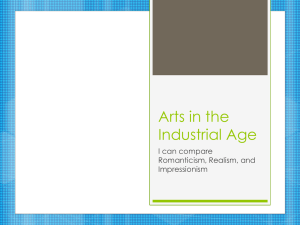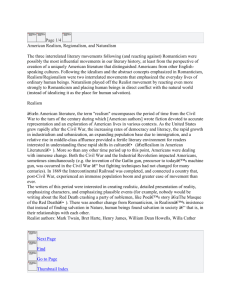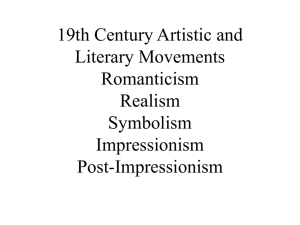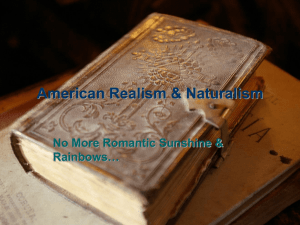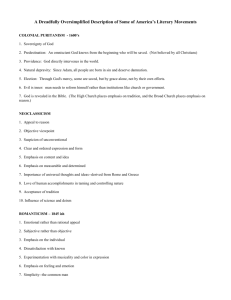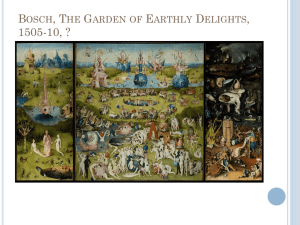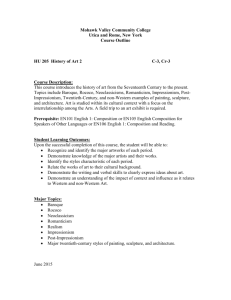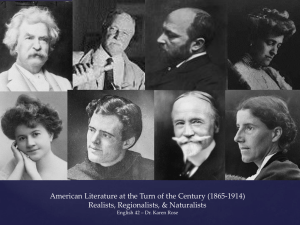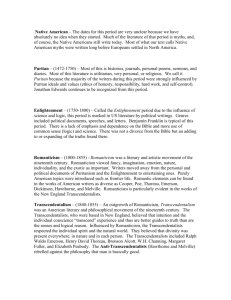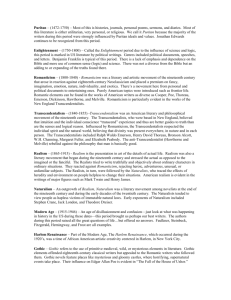instantaneous art through the ages
advertisement
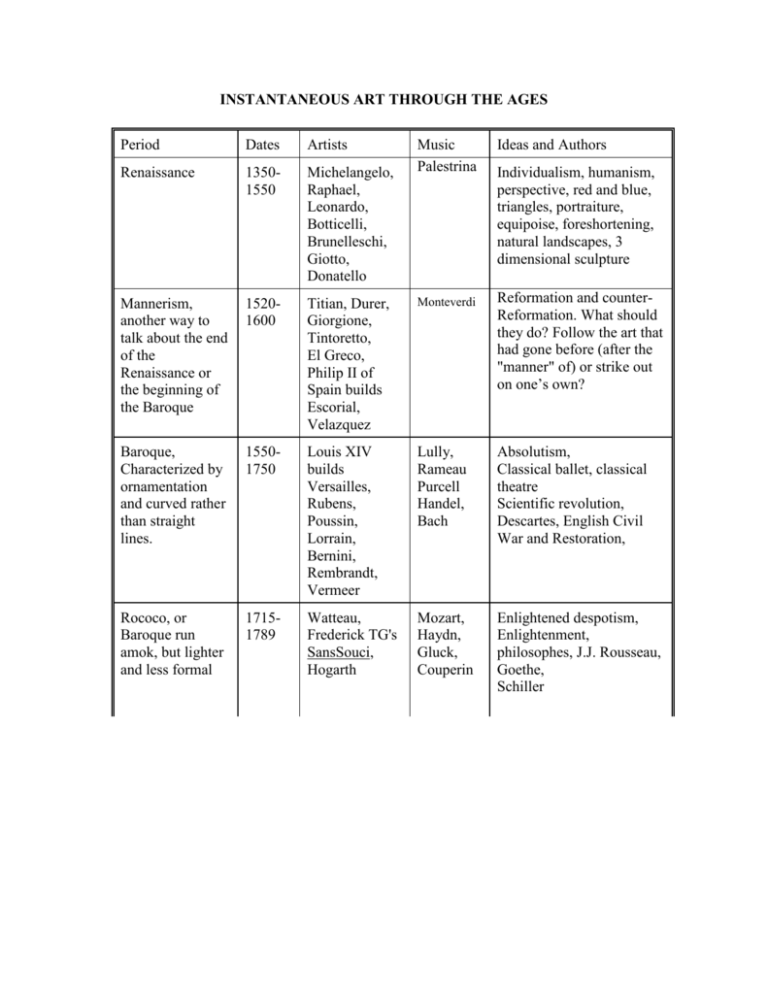
INSTANTANEOUS ART THROUGH THE AGES Period Dates Artists Music Palestrina Ideas and Authors Renaissance 13501550 Michelangelo, Raphael, Leonardo, Botticelli, Brunelleschi, Giotto, Donatello Mannerism, another way to talk about the end of the Renaissance or the beginning of the Baroque 15201600 Titian, Durer, Giorgione, Tintoretto, El Greco, Philip II of Spain builds Escorial, Velazquez Monteverdi Reformation and counterReformation. What should they do? Follow the art that had gone before (after the "manner" of) or strike out on one’s own? Baroque, Characterized by ornamentation and curved rather than straight lines. 15501750 Louis XIV builds Versailles, Rubens, Poussin, Lorrain, Bernini, Rembrandt, Vermeer Lully, Rameau Purcell Handel, Bach Absolutism, Classical ballet, classical theatre Scientific revolution, Descartes, English Civil War and Restoration, Rococo, or Baroque run amok, but lighter and less formal 17151789 Watteau, Frederick TG's SansSouci, Hogarth Mozart, Haydn, Gluck, Couperin Enlightened despotism, Enlightenment, philosophes, J.J. Rousseau, Goethe, Schiller Individualism, humanism, perspective, red and blue, triangles, portraiture, equipoise, foreshortening, natural landscapes, 3 dimensional sculpture Neo-classical (on the way to fullblown Romanticism) 17891820 David, Ingres, Gericault Goya, Gros, Canova Beethoven, Romanticism, Naturalism and the Barbizon School 1820- Delacroix, "Liberty Leading the People" Rude, Corot, Millet, Theodore Rousseau Berlioz Weber, Chopin, Realism. (It’s followed by “Naturalism” in literature, slightly grittier, and with more attention to social problems and social context) mid19th century to 1870 Daumier (is to his time what Hogarth was to his), Courbet, Haussmann, Eiffel (who designed the tower of the same name) Wagner, Franck, Brahams 1860 Gluck, Cherubini, Schubert Rossini Mendelssohn Liszt, Schumann J. Strauss, Jr. (aka the Waltz King) Bizet, Verdi, Puccini French Revolution to July Monarch of 1830. Beginnings of nationalism Dumas, Hugo, Byron, Gautier, Blake, Sand, Keats, Shelley, Walter Scott. Emotional reaction against the neo-classical. Use of nature, patriotism, heroism, the supernatural, glorification of the past, cute peasants. Balzac, Dickens, Zola, Maupassant Ibsen, Nietzsche, Proust, Baudelaire Goes with positivism, Realpolitik, based on fact not emotion. Un-cute peasants and un-cute workers. Industrial progress. Trains. Impressionism Gets its name from Monet’s painting “Impression of Sunrise” shown at the Salon des Refusees in 1874. Followed by PostImpressionism, pointillism (“Sunday Afternoon on the Island of La Grande Jatte”) 18701920 Manet, Monet, Degas, Renoir, Rodin, Cezanne, Gauguin, Seurat, ToulouseLautrec, Mary Cassat, Sisley, Van Gogh Faure, Debussy SaintSaens, Mahler New subject matter and a new way of looking at the world. Everyday life of the middle class becomes an acceptable subject for high art. Painting in the outdoors gives new chance to study the play of light. Identify it with “La Belle Epoque” Modern Artists influenced by Freud, Einstein, WWI and WWII, Atomic Age 20th century Kathe Kollwitz, Otto Dix, Picasso, Matisse (one of "Les Fauves" the Wild Beasts), Maillol, Chagall, Miro, Brancusi, Henry Moore, Calder, Braque, Giocometti Roualt, Klee, Modigliani Marcel Du Champ, Dali, Andy Warhol, Jackson Pollack, Willem de Kooning Stravinsky Prokofiev, Gershwin, Poulenc Satie Webern, Berg, R.Strauss Bartok, Ravel Realism (a different kind than that which followed Romanticism. It responded to WWI and post-war decadence, especially in Germany.) Expressionism (Looks within to a world of emotional and psychological states); Abstractionism (analyzing, deriving, detaching geometrizing, and in short distilling the essence from nature and sense experiences.) Cubism, Futurism (Fascist-flavored Italian art), Surrealism (describes dream fantasies, memory images and visual paradoxes); Dadaism (response to horrors of WWI-nihilistic, challenges polite society, against order and reason);Social realism (artist's protest against intolerable conditions besetting humankind)
